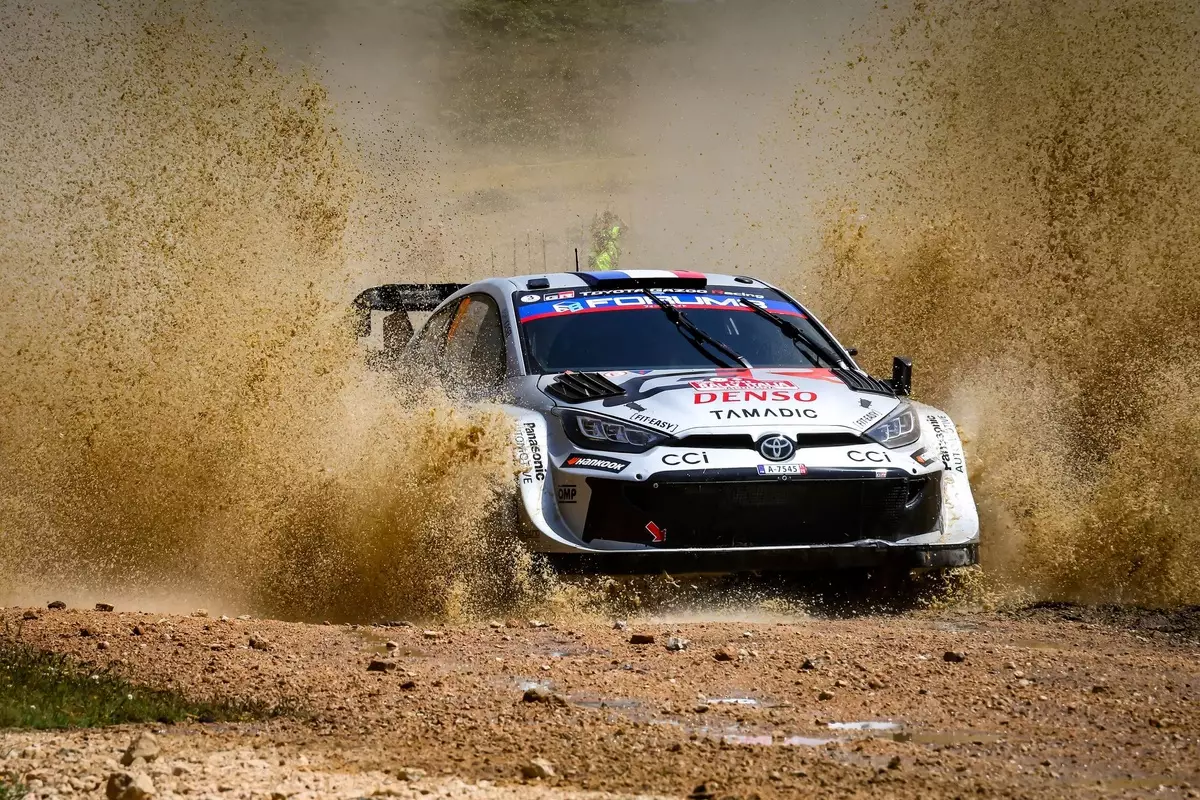The Rally Italy Sardinia has long been a crucible for drivers, demanding not only exceptional skill but also immense mental toughness. As the competition unfolds, it becomes a theater for both triumph and tribulation, where the slightest miscalculation can dramatically alter the rankings. This year, eight-time world champion Sebastien Ogier has been at the forefront, showcasing resilience even in the face of fierce competition and unexpected hurdles. The event serves as a reminder that motorsport is as much about the driver’s psyche as it is about their performance behind the wheel.
Ogier’s Rocky Road to Victory
Initially maintaining a slender lead of 2.1 seconds over challenger Adrien Fourmaux, Ogier’s position became precarious during the taxing stage 8. This stage in particular, stretching over 24.34 km in rough terrain, would prove pivotal in the race. While Ogier displayed unwavering confidence, Fourmaux’s ambition led to misfortune when he encountered an unseen rock. A front-right puncture inflicted upon his Hyundai i20 N Rally1 forced a wheel change that would foil his chances of making significant progress. What’s particularly striking is Ogier’s strategic maneuvering during this incident; despite the visibility challenges posed by Fourmaux’s dust, he adopted a calculated approach that eventually enabled him to capitalize on Fourmaux’s setbacks.
In the world of rallying, the capacity to adjust one’s strategy based on prevailing conditions is invaluable. Here, Ogier exhibited a masterclass in adaptability, allowing him to reclaim leadership in the rally standings, a testament to his enduring tenacity and experience. Such moments elucidate why Ogier is held in such high esteem within the rally community: his ability to maintain composure under pressure sets him apart from competitors fresh on the circuit.
The Intricacies of Team Dynamics
The complexities of team strategies were evident as Hyundai driver Ott Tanak emerged as a formidable contender during the stages that followed Ogier’s resurgence. With a winning stage time that pushed him from third to the rally lead, Tanak’s performance underlined the importance of teamwork and communication. His team’s quick assessment and reaction to Ogier’s unfolding drama demonstrated how essential collaborative dynamics are in high-stakes situations. Each driver must rely heavily on their team for accurate information regarding road conditions and competitors’ standings, which can decisively influence the overall outcome.
This interplay became even more pronounced as the layers of competition unveiled themselves. With Kalle Rovanpera seizing third place after Fourmaux’s troubles and Sami Pajari showing resilience despite minor setbacks, it becomes clear that cooperative efforts and personal resolve are crucial in navigating the demands of the Sardinian terrain. Rovanpera’s adaptability following overnight changes to his vehicle’s setup illustrates how the margin between victory and defeat can hinge on a team’s commitment to improvement and innovation.
A Day of Trials for Fourmaux
For Fourmaux, the rally turned into a litany of challenges. After his initial puncture, he faced the psychological burden of falling behind, which began to manifest in additional errors as he struggled to regain momentum. His subsequent mishaps — from navigating dust to miscalculating turns leading to off-road encounters — reinforced the importance of mental fortitude in rally driving. This cascade of setbacks not only pushed Fourmaux back in the standings, placing him ninth, but also highlighted how quickly fortunes can shift in this high-octane sport.
Yet it is noteworthy how the relentless nature of the sport can serve as a catalyst for learning and growth. The trials faced by a driver like Fourmaux could become invaluable lessons, paving the way for future successes. Such experiences often forge a driver’s character, preparing them for the unpredictable demands of future races.
Resilience and Recovery
The Rally Sardinia illustrates that the road to success is rarely smooth, often dotted with unexpected bumps and twists. The resilience displayed by drivers like Ogier and Tanak, juxtaposed against Fourmaux’s challenging day, embeds a sense of drama within the sport. This resilience transcends mere physical demands; it underscores a philosophical view of rally racing—where every stage can rewrite the narrative, every challenge can unveil new strength, and where the spirit of competition thrives against the odds.
In this dynamic world of rally racing, the pursuit of victory becomes less about the destination and more about the journey itself, echoing the age-old truth that the ability to recover and adapt defines true champions.


Leave a Reply